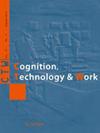Competency-based assessment of pilots’ manual flight performance during instrument flight training
IF 3.4
3区 工程技术
Q2 ENGINEERING, INDUSTRIAL
引用次数: 0
Abstract
Abstract A pilot's control behavior has a direct impact on aviation safety. To adapt to new flight training reforms, a competency-based assessment method is proposed in this paper. First, assessment scenarios, key competencies and observable behaviours were determined. Then, observable behavior assessment indexes were developed based on standard operating procedures and practical examination standards. Flight training data were analyzed based on curve similarity theory and a time series fast retrieval algorithm, and the assessment indexes were scored. The competency assessment method was established by quantifying “HOW MANY” and “HOW OFTEN” observable behaviors according to the assessment indexes score results. Finally, the fuzzy C-means clustering algorithm was used to classify the assessment values, and assessment results were obtained. A teardrop pattern procedure was used to test the reliability of the assessment method. The results indicate that the correlation coefficient between the model evaluation and the expert evaluation is 0.947 with a significance level of 0.01, reliably and objectively quantifying manual flight performance and improving the scientific nature of manual flight performance assessment methods. Flight training institutions can use this method to establish diverse assessment scenarios and formulate corresponding assessment indexes based on the characteristics of each pilot to reasonably evaluate the manual flight performance of pilot. Targeted training methods can then be adopted for pilot with different performance levels to improve their competency.仪表飞行训练中飞行员手动飞行性能的能力评估
飞行员的管制行为直接影响航空安全。为了适应新的飞行训练改革,本文提出了一种基于能力的考核方法。首先,确定评估情景、关键能力和可观察行为。然后,根据标准操作流程和实际考核标准,制定可观察性行为评价指标。基于曲线相似理论和时间序列快速检索算法对飞行训练数据进行分析,并对评价指标进行评分。根据测评指标得分结果,量化可观察行为的“多少”和“多少次”,建立胜任力测评方法。最后,采用模糊c均值聚类算法对评价值进行分类,得到评价结果。采用泪滴图法检验评价方法的可靠性。结果表明,模型评价与专家评价的相关系数为0.947,显著性水平为0.01,可靠、客观地量化了人工飞行性能,提高了人工飞行性能评价方法的科学性。飞行训练机构可以利用该方法,根据每位飞行员的特点,建立多样化的评估场景,制定相应的评估指标,对飞行员的手动飞行性能进行合理评估。针对不同表现水平的飞行员,可以采取针对性的培训方法,提高他们的能力。
本文章由计算机程序翻译,如有差异,请以英文原文为准。
求助全文
约1分钟内获得全文
求助全文
来源期刊

Cognition Technology & Work
ENGINEERING, INDUSTRIAL-
CiteScore
6.90
自引率
7.70%
发文量
26
审稿时长
>12 weeks
期刊介绍:
Cognition, Technology & Work focuses on the practical issues of human interaction with technology within the context of work and, in particular, how human cognition affects, and is affected by, work and working conditions.
The aim is to publish research that normally resides on the borderline between people, technology, and organisations. Including how people use information technology, how experience and expertise develop through work, and how incidents and accidents are due to the interaction between individual, technical and organisational factors.
The target is thus the study of people at work from a cognitive systems engineering and socio-technical systems perspective.
The most relevant working contexts of interest to CTW are those where the impact of modern technologies on people at work is particularly important for the users involved as well as for the effects on the environment and plants. Modern society has come to depend on the safe and efficient functioning of a multitude of technological systems as diverse as industrial production, transportation, communication, supply of energy, information and materials, health and finance.
 求助内容:
求助内容: 应助结果提醒方式:
应助结果提醒方式:


